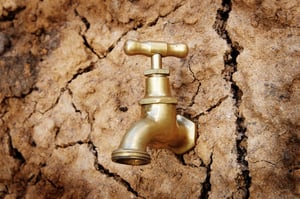 When rainfall is less than normal for an extended period of time, the flow of natural rivers, lakes and streams declines. When these water levels decrease, the depth to water in wells increases. If dry weather and water supply problems develop, the area is considered to be in a drought, which could be problematic if your home relies on well water or is placed on unsteady land. Here are some of Warner Service’s solutions for how to keep your home stable during a drought:
When rainfall is less than normal for an extended period of time, the flow of natural rivers, lakes and streams declines. When these water levels decrease, the depth to water in wells increases. If dry weather and water supply problems develop, the area is considered to be in a drought, which could be problematic if your home relies on well water or is placed on unsteady land. Here are some of Warner Service’s solutions for how to keep your home stable during a drought:
Problem: Droughts affect the height of the underground water levels of aquifers found below the surface of the Earth. If your home relies on a well, this could potentially be dangerous. If your well is pumped at a faster rate than the aquifer can recharge by precipitation then the water level falls. This may result in less clean drinking and bathing water. A lack of rainfall also means that there is an increase in polluted water due to the inability to dilute industrial and agricultural chemicals.
Solution: If there is a drought and your home relies on a well for drinking and bathing water, be sure to follow your state’s guidelines as to how much water can be used during the duration of the drought. Call a professional to adjust the well pump to meet these guidelines. You should also prepare by purchasing gallons of water at your local grocery store in case of emergency.
Problem: Droughts can cause long-term economic stress and reduced incomes for some professions, especially farming and other agribusinesses. They can also lead to parched soil, which can cause cracked home foundations in basements, crawl spaces and slabs. This damage, which can exceed up to $1 billion in repairs nationwide, has been occurring in 40 of the 48 contiguous U.S. states. The underground cracking can result in the inability to open windows and doors, cracked brickwork, plumbing leaks and split drywall.
Solution: Because insurance companies rarely cover drought-related incidents, it is best to prepare your home ahead of time. Take precautionary measures by keeping the soil near your home’s foundation as moist as possible. You can also place potassium-loaded mulch, which can slow moisture evaporation, around your landscaping near the foundation. If you do find a crack in the drywall, brick or foundation, it is best to call a professional immediately. The longer you wait, the more expensive and extensive the damage will be.
Problem: If your home relies on hydroelectric power (electricity that is created from the kinetic energy of running water), you could be out of luck during a drought. Companies that run with hydroelectric power will charge more for their service due to less available supply.
Solution: Switch to solar or wind energy. Both are eco-friendly (unlike natural gas, which emits carbon dioxide and other greenhouse gases) and less costly. These renewable resources cost between 8 to 10 cents per kilowatt-hour. Also, natural gas and coal need water for the cooling process, so electricity generation is at risk. However, wind and solar energy do not rely on water, so your home is in the clear when it comes to a drought.
If you live in an area where a drought is likely or often, make sure you prepare yourself. Feel free to stock up on emergency essentials, such as animal feed (if necessary), gallons of water and canned goods. If you find a crack in your home or hear a gunshot-like noise, contact a professional as soon as possible to avoid further damage and spending. While you’re at it, ask about installing solar panels and harvesting wind energy. If you have any questions, contact Warner Service today.

